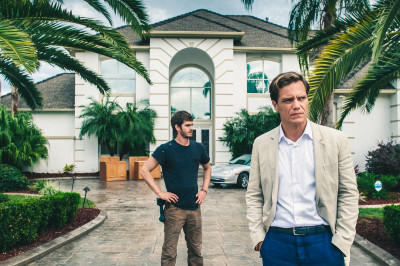
Credit: Hooman Bahrani / Broad Green Pictures
During the Great Recession of the 2000s, foreclosures were rampant and workers lost their jobs left and right. It was a terrible time for middle-class America, and we are still feeling the effects today.
“99 Homes,” written and directed by Ramin Bahrani, takes place in the midst of this madness. The story follows Dennis Nash (Andrew Garfield), who is evicted from his family home along with his mother Lynn (Laura Dern) and son Connor (Noah Lomax) despite a lifetime of hard work coupled with conflicting messages from the bank.
The eviction scene is powerful in its this-could-be-you realism and the coldness of the act itself. Nash’s entire life is uprooted and dumped on the curb outside his home, which is now owned by the bank. The family is given two minutes to gather important belongings before the construction crew guts the house. The sequence is hard to handle, partly due to wincingly realistic performances by Garfield and Dern.
However, this sequence is not the only one that elicits a visceral reaction. In the first shot, we see the aftermath of a gunshot suicide committed by a man who could not handle the humiliation of being evicted. This situation is already extreme, but the callousness with which presiding real estate agent Rick Carver (Michael Shannon) handles it is the real gut-punch.
Carver is, without question, a terrible human being. His stony countenance presiding over Nash’s eviction makes the event that much more frustrating. It borders on infuriating to see Carver preoccupying himself with a potential home to sell while Nash moves boxes out of the home he just lost. This is all to say that Shannon’s seedy performance did not fall short.
Sure enough, though, Carver ends up offering Nash a job. With everyone laid-off and struggling, freelance construction and handyman jobs are hard to come by. Nash’s family is already living in a seedy motel half full of other evicted families, so he’s forced to accept work from the man who ruined his life. He keeps this secret from his family, insisting to himself that it is only a temporary fix and there are no other options.
What follows is a generally predictable story about a man doing the wrong thing for the right reason, and trying to keep his morality in sight while dancing with the devil. Even with its documentary style and real-world setting, the themes explored are nothing new. “99 Homes” is in many ways a blue-collar “Wall Street.” Carver’s claim that “America doesn’t bail out losers — America bails out winners” is an updated echo of “Greed is good.”
The comparison is also apt in that Carver does not always make money legally. Part of what makes his job offer so enticing is the chance to steal money from the government, a seemingly victimless crime that helps Nash provide for his family. But soon, Nash becomes such a convincing protégé that he begins working evictions himself, filling Carver’s shoes in countless replays of his own eviction scenario, some far worse than his own.
At times it is hard to root for Nash, but Garfield’s performance is compelling enough to carry the film through these weaker moments. He wears his emotions plainly and simply, creating an almost child-like character with none of the guile or malice of a truly bad person. Nash is not a complex person, but a real one, susceptible to influence by the glamour of wealth and the underdog’s dream of a final reward after a lifetime of monetary injustice.
Laura Dern does not have much to work with other than two or three key emotional sequences, in which she is perfectly acceptable. It is worth noting that Bahrani managed to direct a few child actors, including Noah Lomax, to almost perfection. Their conversation seems as genuine as anything in the film.
Realism is the best thing “99 Homes” has going for it, aside from Garfield’s performance. The cinematography is subtle but solid, not distracting from the injustice of the foreclosures at hand. If only the story were fresher.
















































































































